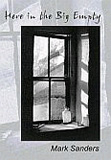September 2, 2008HERE IN THE BIG EMPTY by Mark Sanders
Review by Cameron Conaway
HERE IN THE BIG EMPTY
by Mark Sanders
The Backwaters Press
3502 North 52nd Street
Omaha, Nebraska 68104-3506
ISBN: 0-9765231-4-0
92 pp., $16.00
www.thebackwaterspress.com
“Plain speech for a plain people” is the opening line of poetry in Here in the Big Empty. And it is shortly after this declarative, colon-ending line that the few negatives of the book present themselves. Opening a book review with the less-than-fabulous is often a precursor to a vicious barrage. The opposite is the case here. And for some readers, of course, the negatives may very well be positives.
Plain speech for a plain people:
weather-words gray as old lumber;
old sheds and old houses
sitting on the tilted legs of wind; (11)
This opening stanza of the poem “Plain Sense” attempts to set the stage for what is to come. William Carlos Williams comes to mind. The way he fought for writing of everyday circumstances in the lives of people. The way his language was often accessible but rich to readers on various levels. Instead, what happens is unexpected. Shifts from plain speech–often stunningly concrete–language like the above quote paired side by side to much-less discernable abstractions. Lines like “verbs the cranes dancing” and “an idea through black dirt.” Some may view the shift as pure versatility, but the leaps feel jarring the majority of the time, and might make a reader feel in the poem one stanza and completely removed the next. Eventually, the reader will be brought back in with some perfect detail or Rumi-esque meditative line. The need to point out the issue has been addressed.
It seems as though Mark Sanders understood the shifts as part of the working whole. Several lines later in the same opening poem we here:
Two ways of looking at things:
Rain falling onto your face from a black sky.
Or, the head turned toward the ground,
the face blurred in the puddle where rain drops. (11)
It’s as though Sanders was pointing to his own work and saying, ‘look, there are two styles going on here.’ And honestly–with the amount of poetry published today–if one person likes one aspect of Sanders’ style and dislikes the other, they are in for enjoying the majority of the book. A majority is an extraordinary amount to fully enjoy from a book of poetry. The abstractions take place primarily at the beginning and end. So the meat of Here in the Big Empty will most likely be easier to appreciate. The other ‘negative’ I point out is that when Here in the Big Empty shifts more into a narrative approach to poetry rather than an Imagist approach, the narrator can often be too plain-spoken.
“She looked like a doll,
she looked good.”
Stares pierced me.
Embarrassed, I gazed down into the trash can
as if into the hole of myself. (28)
In the context of the poem, to state “embarrassed” only to follow it up with a strong line felt unnecessary and as if the reader needed everything handed on a silver platter. Minor stuff really, but too often the minor quibbles of a work aren’t addressed and future buyers may be unfairly led to a book. Book reviews shouldn’t be advertisements; we’ve enough of that in our lives. On to the positives.
What will not stop is the musical quality of Sanders. It is often the singular element that can carry the reader through the story. At times, it may lead you to read and repeat the lines aloud just to hear how well they flow. “Bavarian China chipped or cracked: chapped lips against our lips” (12). Other times the poetic beauty of a line mingles with the ‘real character’ of Mark Sanders. It’s a combination that began as admiration and grew into an attachment as the book progressed. For example, the poem “The Luxury of Living Here” begins with “So damned hot, you’d love to bathe in the sky,/ that blue-gray porcelain tub,” and ends with “You sweat. You sip a beer. You keep your shit together./ It doesn’t get much better than this” (20). We hear this stunningly accurate yet plain spoken language again in the poem “Butchering Chickens,” “I was seven the first time/ I held the knife and put it through” (31). And:
When she shows began,
I took my girl
to the monkey trailer
where the chimpanzee,
smelling her,
the way I might have liked to,
jacked off,
slinging jism. (37)
Moments of inspiration came from such language as well:
I’ve read how the pinecone
cannot seed except by flame,
the forest on fire–that things destroyed
replenish. A man, I believe, is pinecone, too. (81)
Here in the Big Empty, when it adheres to the opening line “Plain speech for a plain people,” is most powerful. Unfortunately and most notably towards the beginning, the book deviates from this course. But it rights itself. And the hyphenated words like “sister-sobbing” mingle with the alliteration and repetition to tell stories that always seem to come back to weather and those loving and painful times with the family. Mark Sanders’ poetry at its best has an awareness to detail that rivals that of any poet.